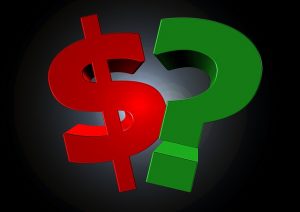Valuing a Business: Multiples, Schmultiples!
Valuing a business is fun and exciting! It must be because we hear from business owners all the time how easy it is.

They tell us it’s just a matter of “multiples”!
We’re constantly asked what “multiple” we use for valuing businesses. We regularly hear that an owner wants “…a five multiple”. We occasionally hear that an owner, because he has a software company that he’s considering selling, wants a 30 multiple because that what people are paying for shares of Microsoft!
Idiots all.
Valuing a business based on some random multiple is like valuing a house based on some dollar value per square foot.
There are houses that are worth $2,500 per foot and others worth $100 per foot. Value has to be calculated on a case-by-case basis.
Some business owners want a multiple of sales.
Well, Bucko, if the business is losing money, it doesn’t really matter what the sales are – especially if the business is losing money on every sale. In that situation, increasing sales by 20% will simply increase the losses.
Granted, some buyers are more interested in how an acquisition will improve the performance of their existing business – a strategic buyer – than in the stand-alone performance of the target business. But that fact notwithstanding, the vast majority of business buyers at interested in the answer to this question:
“How much money will this business put in my pocket?”
 For most business buyers, the issue of sales revenue is a minor one and is important from the standpoint of determining whether the trend of sales revenue is up or down. The main issue is the one about how much dough goes into the pocket of the owners. Once they know that answer, they then ask themselves, “How much am I willing to pay for that?”
For most business buyers, the issue of sales revenue is a minor one and is important from the standpoint of determining whether the trend of sales revenue is up or down. The main issue is the one about how much dough goes into the pocket of the owners. Once they know that answer, they then ask themselves, “How much am I willing to pay for that?”
The answer the THAT question depends on a number of factors, including:
- What rate of return do I want?
- How quickly do I want the business to cover the acquisition costs?
- How steady have the margins been and have they been trending up or down?
- What are the risks to the business that will impact its ability to perform as projected?
We’ve launched a coaching program specifically tailored to Realtors that want to sell businesses, business owners and to anyone that wants to become a business broker.
If you’d like to learn more, email me at jo*@*******************og.com
This one paragraph should clearly illustrate that no random multiple can be applied to all businesses – or even all businesses in the same industry and geographic region.
As a general rule, business valuation can usually be reduced to a function of two factors, adjusted earnings and a multiple. So, the most critical question is “what is the true earnings of the business?” This is what has to be determined before doing anything else.
Adjusted – or “True” – Earnings
It is extremely rare that the true earnings of a business are shown on the P&L statements or tax returns. There are two primary reasons for that:
- Accounting methods used by many private businesses are structured to minimize the tax liabilities faced by the owners and;
- It is fairly common that owners of such businesses run certain expenses that are, in reality, “owner benefits”, through their business.
 So, Job One is to examine the P&Ls and tax returns to determine what amount of which expenses are not really germane to the business’s operations and then subtract those non-germane expenses and recalculate to find the adjusted – or true – net; the Discretionary Earnings. THIS is factor #1.
So, Job One is to examine the P&Ls and tax returns to determine what amount of which expenses are not really germane to the business’s operations and then subtract those non-germane expenses and recalculate to find the adjusted – or true – net; the Discretionary Earnings. THIS is factor #1.
Job Two is then to determine the multiple – everybody’s favorite term – and you have to know that the multiple, whatever it may be, is applied to the Discretionary Earnings, not to revenue.
Determining the multiple is going to take a little work. The process is FAR to detailed and complex to include in a single blog post. In fact, the procedures and techniques we use require more than a dozen lectures over two modules in our course, “Learn How to Value and Successfully Sell Businesses“.
But I can tell you that there are two elements to the process.
_____________________________________________________________________________
Our course, “Learn How to Value and SUCCESSFULLY Sell Businesses“, teaches you how to value and sell businesses.
Become a Professional Business Broker…
The first is to determine what similar businesses have sold for; that is, what was the multiple of Discretionary Earnings did the sale prices of those other businesses represent?
The second is to determine what adjustments have to be made to that range of multiples – or to the results of applying that range of multiples – to the Discretionary Earnings of the business you’re valuing.
Multiples are important in our business. But we have to know what they are, how to use them and what to apply them to. And the last part of that statement is the most important.
Applying any multiple to the wrong base number – the bottom line on the P&L, the top line on the P&L, the “taxable income” line on the tax return will, as a rule, give us just as accurate a value as applying it to the attendance figures for the upcoming Tokyo Olympics – which is to say, not accurate at all.
The Bottom Line
Applying any multiple to the wrong base number – the bottom line on the P&L, the top line on the P&L, the “taxable income” line on the tax return, etc – will, as a rule, give us just as accurate a value as applying it to the attendance figures for the upcoming Tokyo Olympics – which is to say, not accurate at all.
Although when valuing a business the two main factors – adjusted (or discretionary) earnings and the appropriate multiple – in the valuation calculation are easy to identify conceptually, getting both of these numbers correct takes knowledge and time. But without correct numbers to start with, what’s the point?
Professional business brokers – or Realtors that want to add business brokering to their arsenal of services – have to know how to do this – and how to explain it to our selling clients.
If you have any questions or comments on this topic – or any topic related to business – I’d like to hear from you. Put them in the comments box below. Start the conversation and I’ll get back to you with answers or my own comments. If I get enough on one topic, I’ll address them in a future post or podcast.
I’ll be back with you again next Monday. In the meantime, I hope you have a safe and profitable week.
Joe
 #business #businessacquisition #sellabusiness #becomeabusinessbroker #businessbrokering #businessvaluation #MergersandAcquisitions #buyabusiness #sellabusiness
#business #businessacquisition #sellabusiness #becomeabusinessbroker #businessbrokering #businessvaluation #MergersandAcquisitions #buyabusiness #sellabusinessThe author is the founder of Worldwide Business Brokers and holds a certification from the International Business Brokers Association (IBBA) as a Certified Business Intermediary (CBI) of which there are fewer than 1,000 in the world. He can be reached at jo*@*******************og.com

